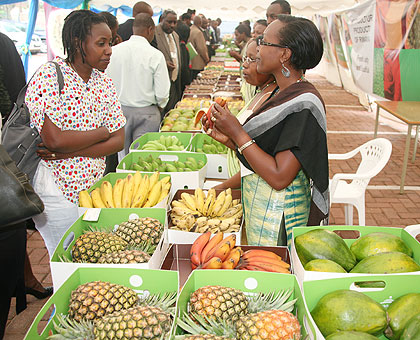Rwandan traders who export goods to European countries go through difficult conditions, owing to tight restrictions, the traders claim.


Rwandan traders who export goods to European countries go through difficult conditions, owing to tight restrictions, the traders claim.The traders observe that some products are not allowed in the European markets, especially fruits. They argue that, more often than not they are forced to export their goods to the United States where they say the market is easier to access."I export products to Europe and USA but you will find that in Europe they are more protective of their local businesses; that’s why some products, especially horticulture exports are not allowed in,” Nicolas Ndagijimana, also a coffee exporter, said.Maggie Uwimbabazi Kagimbanyi, also a coffee exporter, noted that she diverted to US and Japan markets because of limited market access in Europe. Nathan Gashayija, the director of economic infrastructure and productive unit in the Ministry of EAC affairs, said the issue would be addressed after the EAC concludes negotiations between the EU under the Economic Partnership Agreements (EPA)."There are some disagreements on different issues like domestic and export subsidies, where we would like to support our traders to exploit their market and they (EU negotiators) don’t want it,” he said.He explained that the negotiations have delayed because the EU negotiators are against EAC’s proposed indicators that would monitor the outcomes in the economic development areas.According to latest statistics from the National Bank of Rwanda, in the first quarter of 2012 (from January-March), Rwanda’s exports amounted to 63 tonnes, worth $104.8 million.That represented an increase in exports from the same period last year, where volume of exports were at 30.3 tonnes generating $80.9 million.The most exported products included coffee, tea and minerals.The traders say it would be important for the EAC to accelerate the EPA negotiations to address the current difficulties.Meanwhile, the East African Legislative Assembly (EALA), last week, passed a resolution, urging the EAC Council of Ministers to engage the EU in order to address pertinent concerns and contentious issues for agreements to be signed. If the agreements are signed, the two blocs will have access to both markets and traders from the two communities will be free to carry out business without barriers."Anything concerning market access for us will always be a good initiative and it would be important for the agreements to be signed,” Jean Paul Rwagasana, said a Rwandan trader who imports merchandise from Europe.Among the most sticking issues in the ongoing EPAs negotiations is EU’s insistence that EAC should not enter other trade/economic deals with any other community, without its consent, after the finalisation of the deal.EAC is also concerned that an unconstrained agreement could expose the local industry to stiff competition from European firms, which would stunt private sector development in EAC.


